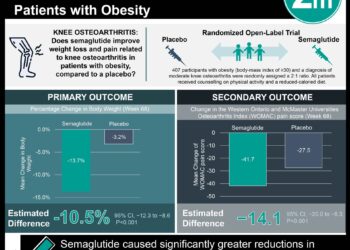Weight loss before gastric bypass may reduce post-operative complications
1. The percentage of pre-operative weight loss and underlying BMI were major determinates of post-operative complications from bariatric surgery.
2. Patients whose pre-op weight loss was in the top 75th percentile had fewer post-operative complications compared to the patients that were in the bottom 25th percentile.
Evidence Rating Level: Level 2 (Good)
Study Rundown: Annually over 340,000 bariatric weight loss procedures are performed worldwide with most programs requiring a minimum of 5-10% total body weight loss prior to surgery. This ensures that patients are motivated to undergo surgery and maintain a lifestyle plan that will successfully maintain long term weight loss. To date, studies have failed to show the effect of pre-operative weight loss on post-operative complications. Prior studies notably lacked a uniform protocol across multiple centers. This study addressed that shortcoming and by analyzing the same weight loss plan across all centers. Subgroup analysis also evaluated patients based on their underlying risk factors for surgical complications including pre-operative BMI, age, gender, and occurrence of diabetes.
Postoperative complications were divided into “any postoperative complication,” anastomotic leakage, bleeding, deep infection/abscess, and minor wound complication. Overall complication rates were 7-15% while serious complication rates (including anastomotic leak, intra-abdominal bleeding and infections requiring re-intervention) were 3-5% for laparoscopic bariatric surgery. This data from the Scandinavian Obesity Registry (SOReg) showed a 13% reduction in overall complication rates between those whose weight loss was in the upper 75th percentile vs those in the lower 25th percentile with more modest outcomes between 50th and 25th percentile patients.
Strengths include the large sample size, long term follow-up at multiple time points and a standardized weight loss protocol using a nationalized database. Potential weaknesses include the retrospective nature of the study and other confounding variables including possibly heavy lifting, diet non-adherence, or poor sanitary conditions leading to infection. Future studies should be randomized and prospective to get a better sense for post-operative complications controlling for these confounders.
Click to read the study published in the Annals of Surgery
Relevant Reading: Does a preoperative medically supervised weight loss program improve bariatric surgery outcomes? A pilot randomized study
In-Depth [retrospective cohort]: The SOReg nationwide registry in Sweden looked at 96% (22,327 patients) of all gastric bypass procedures performed, between Jan 1, 2008 to June 30, 2012 (omitting 2648 patients because they were missing pre-op weight).The median weight was 120kg (72-250kg), 75% were females, average age was 41yrs, and a greater proportion of males were diabetic (24.2% vs 12.5% P<0.001). Median weight loss was 4.8% total body weight, with the quartiles of weight lost 75th (>7.2%), 50th (1.6-7.2%), 25th (<1.6%), and ratio of total cases by quartile was 1:2:1, respectively. Hospital experience and volume were noted with 26 low volume hospitals (performing between 36-530 procedures) and 3 high volume hospitals (performing between 1721-2802 procedures). A total of 2007 (9.1% of cases) patients had any complication. The 25th quartile was used as a reference control with 50th and 75th quartiles analyzed for statistical significance. Of these the patients in the 50th quartile had statistically significant reduction only in minor wound complications (49% ARR, 15/11003, OR: 0.51, CI: 0.39-0.66). The patients in the 75th quartile had statistically significant reductions in anastomotic leak (24% ARR, 50/5471, OR: 0.76, CI: 0.64-0.91), deep infection/abscess (ARR 37%, 43/5471, OR: 0.63, CI: 0.43-0.93), and minor wound complications (ARR 54%, 55/5471, OR: 0.46, CI: 0.33-0.64). Of note weight loss in patients was also divided into BMI quartiles. Patients with BMI>45.8 had statistically significant reduction in all complications with pre-op weight loss in the upper 75th quartile, further highlighting the importance of weight loss at the highest BMIs.
More from this author: Patient-controlled pain meds superior to epidural after laparoscopic surgery, Acute care surgery service improves outcomes, saves cost
Image: PD
©2012-2014 2minutemedicine.com. All rights reserved. No works may be reproduced without expressed written consent from 2minutemedicine.com. Disclaimer: We present factual information directly from peer reviewed medical journals. No post should be construed as medical advice and is not intended as such by the authors, editors, staff or by 2minutemedicine.com. PLEASE SEE A HEALTHCARE PROVIDER IN YOUR AREA IF YOU SEEK MEDICAL ADVICE OF ANY SORT.






